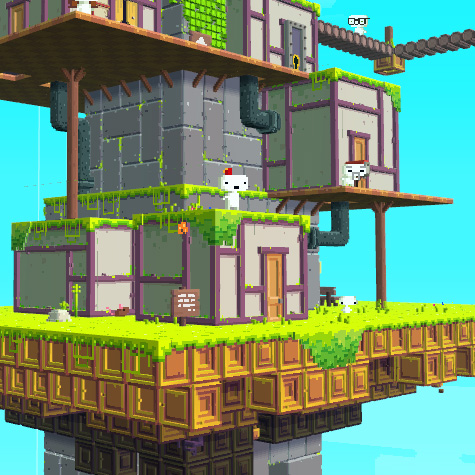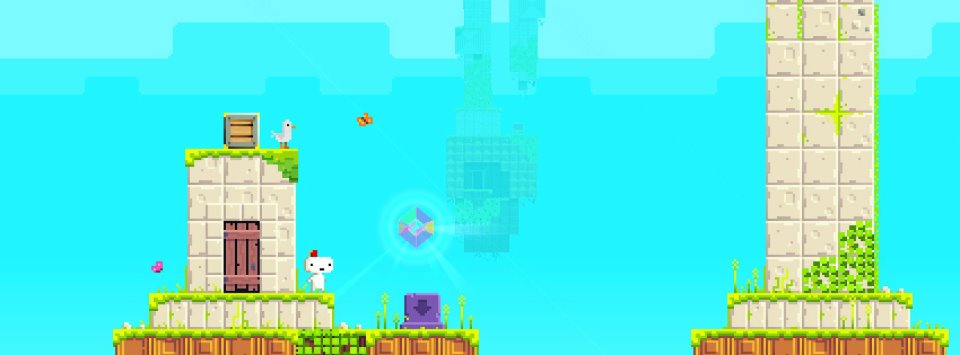FEZ: Perspective-shift yourself back to childhood
Being a game steeped in perspective puzzles, hidden codes, Escher-like architecture and a distinct lack of anything resembling sign-posting: Fez is not short on a challenge or two. However, after exploring its shifting dimensions and succumbing to its intoxicating charms I have found that the most difficult challenge it poses is in asking you to define your experience. It’s difficult to be concise about a game that is so sprawling and labyrinthine. Watch me as I fail.
Fez’s gameplay takes its core mechanics from much-lauded Nintendo classics and the golden age of home console gaming at large. Zelda style exploration is bolstered by simplistic platforming as you begin your 2-D quest from your humble floating island abode. Within minutes of play you are introduced to the third dimension, and this is where the game truly begins. The world of Fez is a series of disconnected, floating platforms and structures. These islands, whilst appearing to be standalone 2-D plains are actually each one side on an imaginary cube. As you plough ahead with the simplistic platforming, you are able to rotate the level in 90 degree increments, allowing you to shift the perspective to bridge gaps, reveal doorways and join platforms. As you delve deeper into Fez’s myriad dimensions, all sorts of other migraine-inducing techniques play into the ‘shifting’ mechanic. Raising water levels, rotating individual parts of scenery with levers and invisible platforms all add to the seemingly overwhelming series of hurdles.
Stylistically and functionally, Fez is the most self-aware and reflexive game I have ever played. It revels in its influences and makes a point of crowbarring the 2-D platformers of our youth into the 3-D age. Whether or not the game as a whole is an allegory for modern game design trends and a true representative for a new wave of intelligent and thought-provoking, independent games is irrelevant: the fact that I can at least attempt to wax lyrical about the ‘meaning’ behind it all is progress enough. To cite examples that prove its ingenuity and depth would be to deny you some of its most stellar moments. However, what I can say is that certain aspects invoked the same sense of wonder as when I had to swap the controller port over to defeat Psycho Mantis. Did I mention how self-reflexive this game is?
For all its postmodern posturing and mind-altering perspective shifting, I’d be doing Fez a disservice if I didn’t confess that its true strength lies elsewhere. Its labyrinthine, dream-like and fractured structure offers a sense of genuine adventure and exploration: the likes of which I haven’t experienced through games for years. This mentality of following the rabbit hole deeper and deeper is an unchecked and unfiltered joy. You simply allow yourself to follow each whim and quickly learn that imposing any sort of regimented structure upon yourself is pointless. Doors are set to tempt and confuse you, tricking you into following paths that exist only in your imagination. It may be hours before you take stock of just how far you’ve traveled and realize how futile it would be to try to find your way back. And you needn’t worry: that’s what warp gates are for. This is the beauty of Fez. You can spend hours going nowhere but be rewarded simply for the act of ‘going’. To fall back on a cliché, it’s more about the journey than the destination. Breaking the game down into one or two-hour sessions is probably essential, should you want to avoid a Pi-aping power drill to the temple scene. Luckily, most sessions will bear some sort of fruit, whether it be discovering a new area, treasure or something totally unexpected altogether.
The game purposefully denies you any sort of clear, definable objectives beyond collecting cubes and whilst particular areas are unlocked by reaching certain amounts, you are given near total free reign from the beginning. As you progress, the game’s subtly-blended environmental puzzles help you adopt the mentality that every piece of scenery has a reason for being there; whether it be part of some as-yet-undiscovered puzzle or contributing to a larger narrative mystery to be unveiled later. What this lack of direction offers is the chance to genuinely explore and embark upon the kind of adventure that made journeys through Hyrule such a pure experience. If you can, I urge you to play it without checking an online guide every time you get stuck. Imagine you are sat in front of your SNES, high-speed internet and super hardcore pornography are but a distant dream, so you must solve the puzzles by talking to friends and bringing in fresh perspectives.
After all of that rambling, you’d be forgiven for thinking that Fez was some sort of unplayable, art-school nightmare, but the essence of Fez is in its perfect marriage between removing/breaking frontiers and in its sincerity and dedication to what makes games so enjoyable in the first place. As a whole, the game is beautifully contradictory; it is fractured, yet complete. It is confusing yet simple. It is avant-garde, yet one of the purest and most grounded gaming experiences I have ever had.
In short, Fez is truly unique, personal, memorable and ingenious. As a life-long gamer, reaching the age at which he begins to ponder upon such things, it is exactly the kind of game that I would kill to have made. Not to taste its success, not even to claim that I was smart enough to design it, but simply because I wish that I could pen a love letter to the medium that was at least half as sincere as Fez is.
Fez is available now on XBOX Live Arcade.





